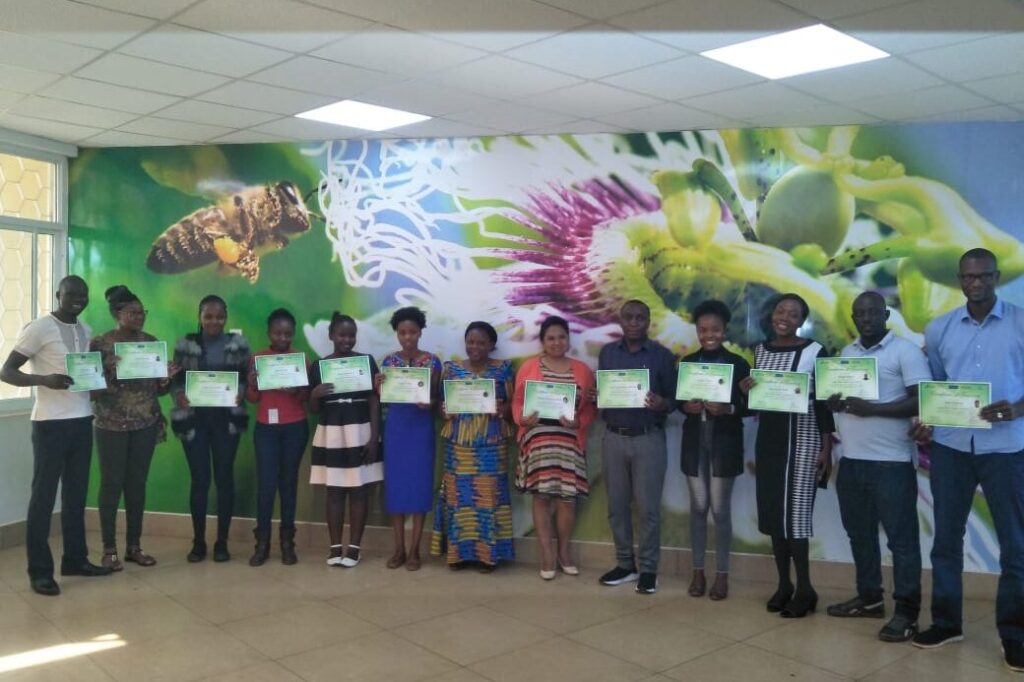Basic Crash Course Nematology - Kenya (BCCN)
Back to WorkshopsBCCN 2025 edition: 8-12 December (APPLICATION CLOSED)
This one week course provides basic training in methods to quantify, qualify and process plant-parasitic nematodes in crops, with an introduction to beneficial nematodes, indicators of soil health and nematodes for biocontrol of insects (entomopathogenic) nematodes. It is undertaken in a ‘hands-on’ fashion permitting participants to experience field conditions and conduct basic research in crop nematology.
This course is organised jointly by ICIPE – International Centre of Insect Physiology and Ecology, IITA – International Institute of Tropical Agriculture in Nairobi Kenya and the International MSc in Agro- and Environmental Nematology (UGent). The venue of the course is the icipe campus in Nairobi, Kenya.
Every year, IMaNema foresees 10 Kariuki-VLIRUOS travel grants for technicians from research institutes and higher education, and agricultural extension officers. This includes flight, accommodation and the cost of the tuition fee to attend the Basic Crash Course Nematology.
These grants are only available for residents from these countries.
Should you be interested to apply for the grant, please send nematology.gent@ugent.be:
- Motivation letter
- CV or resume
- Support letter by your employer
Interested in participating?
There are 5 places available for self-sponsored participants. Please send us an e-mail nematology.gent@ugent.be. The tuition fee is 500€.
Transfer of the tuition fee should be done on the account of Icipe in either EUR, USD or KES. Account details:

Lecturing staff
Dr. Danny Coyne has 25 years of experience in agricultural research and extension in tropical cropping systems across Africa, beginning as a village extension officer in rural Tanzania. He has in-depth knowledge of tropical crop systems through involvement in, and management of, crop protection extension and pest management projects within African National programmes and at International Agricultural Research Centres. Of late he has broadened into the wider field of soil health in relation to plant host-pest-antagonist relations and the ecological aspects. Although he is a very active scientist (140 peer reviewed papers; 8 books and 9 book chapters), training underscores all of his work, whether at the farmer, technician, or academic level. He has frequent contacts with our alumni currently working in Africa.
Dr. Solveig Haukeland is a nematologist specialised on nematodes as biocontrol agents of invertebrates. She worked at NIBIO, the Norwegian Institute of Bioeconomy Research), where she built a lab and expertise on nematodes as biological control agents of invertebrate pests. At Sokoine University of Agriculture, Tanzania she performed research on biological control of banana pests, fruit flies and sweet potato weevils. She additionally did consultancy assignments for the Ministry of Agriculture and Food, among others. She joined ICIPE in 2014 as a CIM (Center for International Migration and Development) integrated expert (German government (GIZ) funded), focusing on building up expertise and experience on tropical plant protection, specifically soil borne nematode pests.
Dr. Laura Cortada is a Senior Scientific Officer at VIB-IPBO where she works on the development of projects and scientific networks to promote the cooperation between European and African research and educational institutions to build up the technical capacity of scientists and enable scientific advances in agriculture for food security. Previously she was an associate scientist at the International Institute of Tropical Agriculture (IITA) (2016-2020), based in Kenya but involved in a whole range of activities across the African continent. While at IITA her work was focused on developing sustainable options for plant parasitic nematode management, primarily in smallholder systems towards improving food security in Africa. Capacity building features prominently in all of Laura’s activities and is heavily involved in developing the next generation of soil health scientists in Africa and is Visiting Professor at UGhent University for the International MSc in Nematology. Laura has lived in East Africa from 2011 until 2020, providing advisory services to small-scale farmers, through public and private organizations, including the Somalia Program of the Food and Agriculture Organization of the UN.
The second master students from the International Master of Science in Agro- and Environmental Nematology (Ghent University) are facilitators of the BCCN, under guidance of a the above mentioned lecturers, in frame of the course Nematology Didactics and Capacity Building.